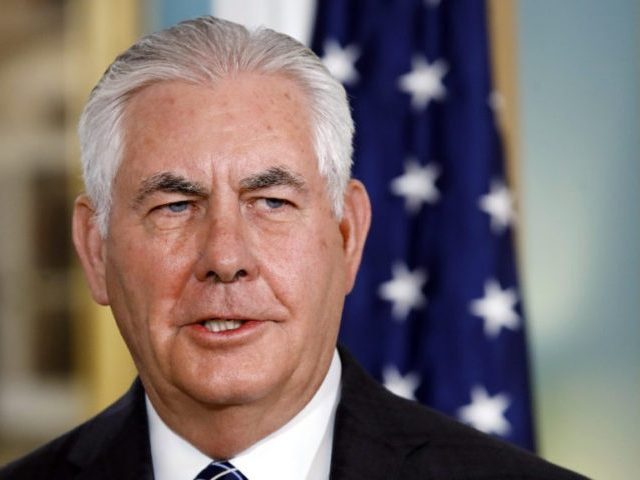A senior State Department official told Reuters on Tuesday that the United States is “quietly pursuing direct diplomacy with North Korea,” despite President Trump’s dismissal of such talks as a “waste of time.”
According to this official, U.S. negotiator Joseph Yun has been using the “New York channel” (i.e. the United Nations) to stay in touch with North Korean diplomats while President Trump and dictator Kim Jong-un lob insults at each other. Supposedly, when Secretary of State Rex Tillerson said diplomacy would continue “until the first bomb drops,” he was not making a grim jest – he was literally describing State Department policy.
Intriguingly, Reuters notes that some U.S. and South Korean officials have specifically stated that “Yun’s interactions with North Korea had been reined in,” but the senior official sourced for Tuesday’s stories said that was not the case. He insisted Yun’s work has “not been limited at all” in either “frequency or substance.” On the contrary, in this account Yun’s portfolio has expanded dramatically to cover everything from the release of Americans held in North Korea to missile testing.
The backdoor diplomacy does not seem to be achieving much, as Reuters sees few signs of improvement in U.S.-North Korean relations, although one of Yun’s requests for Pyongyang was to stop testing nuclear bombs and missiles, and they do seem to have pumped the brakes on such tests. Of course, there are plenty of possible reasons besides backdoor U.S. diplomacy for that, such as North Korea’s underground nuclear test facility inconveniently collapsing.
Speaking at the Center for Strategic and International Studies on Tuesday during his first visit to Washington, high-level North Korean defector Thae Yong-ho endorsed a combination of tough sanctions and “maximum engagement” to resolve the nuclear missile crisis.
Thae said Kim Jong-un became obsessed with nuclear weapons development partly out of insecurity as he attempted to consolidate his grip on the regime developed by his father and grandfather, concern that regimes without a nuclear umbrella could be swiftly toppled by Western powers, and because he felt the torpid and corrupt North Korean military needed a big, dangerous project to motivate it. Also, Kim thought his military officers would have less time to plot a coup against him if they were busy developing nuclear weapons and ballistic missiles.
At a hearing of the House Foreign Affairs Committee on Wednesday, Thae tantalizingly suggested it is “increasingly possible to think about a civilian uprising in North Korea” along the lines of the Arab Spring revolution in Egypt. He suggested disseminating forbidden information to the North Korean populace, persuading China to do more to encourage and assist North Korean defectors, and continuing to weaken the regime through sanctions could help bring about such an uprising, although he cautioned that one reason Kim wants a nuclear shield is to prevent foreign intervention if he finds it necessary to crack down hard on his rebellious population.
If Thae’s assessment is correct, it could suggest an avenue for U.S. diplomacy to explore as the State Department works through that “New York channel.” If the North Korean system is truly so fragile and rife with corruption that a popular uprising is conceivable, then Kim might be more willing to make concessions in exchange for the lifting of sanctions than North Korea’s public statements would indicate. Perhaps other means of addressing his insecurity issues and improving the stability of his regime than developing nuclear missiles could be suggested.
Thae also confirmed the long-standing analysis that North Korea would launch massive missile and artillery attacks against civilian targets in South Korea in the event of any pre-emptive strike, judging that the U.S. and its allies would likely win any ensuing large-scale conflict, but only with an appalling “human sacrifice” of innocent life.
However backdoor diplomacy might be quietly progressing, the public war of words between North Korea and the U.S. continued on Wednesday, with North Korean state media criticizing the “bellicose and irresponsible rhetoric” of President Donald Trump and declaring he “absolutely needs medicine for curing his psychological disorder” as a “war maniac.” President Trump will embark on a 12-day tour of Asia on Friday.

COMMENTS
Please let us know if you're having issues with commenting.